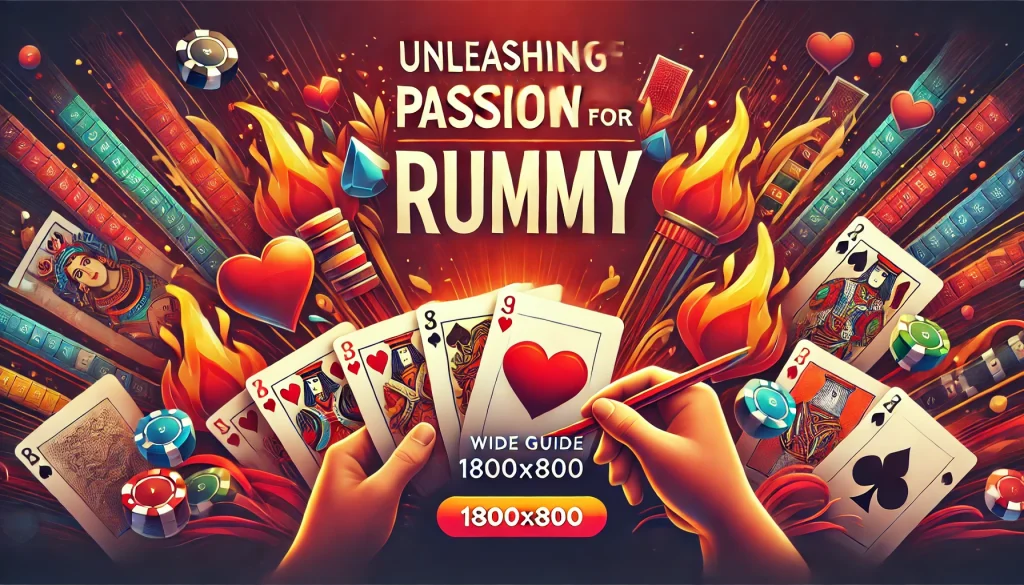Description

From the Fundamentals to Community Involvement The Complete Guide to Rummy Rummy is a fascinating card game that has been played for centuries by players all over the world. The game’s main objective is to form runs and sets using a standard deck of cards. A run is a string of three or more cards in the same suit, whereas a set is made up of three or four cards of the same rank but different suits. The goal is to combine these combinations and then “go out” by throwing away your final card.
Rummy’s strategic depth keeps it interesting for seasoned players, while its straightforward rules make it suitable for players of all ages. Comprehending the fundamental mechanics is essential because it establishes the framework for creating more complex tactics. Players must become familiar with the scoring system in addition to the basic rules, which can change based on the particular Rummy variation being played. The cards that are still in the hands of opponents after one player leaves are usually used to determine how many points are awarded.
While numbered cards are valuable for their face value, face cards typically have higher point values. Players must balance their attempts to form melds with their attention to their opponents’ possible moves, which adds another level of strategy to this scoring system. Players can start to understand the subtleties of Rummy & get ready for more intricate strategies and competitive play by understanding these fundamentals. Players must create a well-rounded strategy that includes both offensive and defensive tactics if they want to succeed in rummy.
Keeping a close eye on your opponents’ picks and discards is one efficient strategy. Players can learn a lot about their opponents’ hands & modify their own tactics by keeping an eye on the cards they are discarding or collecting. To stop your opponent from reaching their objective, you can change your own gameplay if, for example, they are discarding high-value cards, which could mean they are about to form a meld. The likelihood of a player succeeding can be greatly increased by this degree of awareness.
Effectively controlling one’s own hand is another essential component of strategy. In order to maintain flexibility, players should try to hold onto cards that can be used in a variety of possible melds. If you have other hearts or are also collecting cards in the 6–8 range across various suits, for instance, holding onto a 7 of hearts might be advantageous. In order to seek more beneficial combinations, players should also be aware of when to break up possible melds.
It is crucial to strike a balance between meld formation and flexibility in order to successfully navigate the intricacies of Rummy & win. Rummy is a skill and strategy test that enjoys competition and is not merely a game of chance. Both casual and serious players can enjoy the game more if they embrace this spirit of competition. Engaging with opponents who are as passionate about the game as you are can result in exciting, tense matches. Every game is a different challenge because of the competitive nature of rummy, which pushes players to constantly improve their abilities and modify their tactics.
Because of this dynamic, players can grow as competitors, exchange ideas, & learn from one another. Also, rummy competition can take many different forms, ranging from casual games between friends to more official tournaments with set rules & rewards. In addition to improving one’s skills, competing events give one the chance to network with other players who share their passion for the game.
It can be thrilling to compete against others because it forces players to use critical thinking skills & make snap decisions. Players can develop a deeper appreciation for Rummy & experience the camaraderie that comes with shared experiences by embracing this competitive element. With a wide variety of variations to suit varying tastes & ability levels, rummy is a flexible game. Indian Rummy, Gin Rummy, and Kalooki are a few well-known variations, each with its own distinct set of rules and gameplay elements. For example, Gin Rummy, which is usually played by two players, places a strong emphasis on making melds as fast as possible while reducing deadwood, or the number of unmatched cards that are still in play at the end of a round.
However, the traditional gameplay of Indian Rummy is made more complex by the fact that players must form at least two sequences & frequently use two decks of cards. Players can learn new tactics and approaches that work in various formats by investigating these variations, which also keeps the game interesting. Players must modify their strategies to meet the unique challenges and skill-development opportunities presented by each version. Players can improve their overall enjoyment and expand their knowledge of the game by trying out different variations of Rummy.
This investigation may reveal individual tastes in particular playing philosophies or even spark an interest in learning several variations. Making friends with other rummy players who are as passionate about the game as you are is one of the most fulfilling parts of playing the game. Finding people who share your interests can enhance your experience & offer chances for learning and development, whether through neighborhood clubs, online discussion boards, or social media communities. You can share strategies, advice, and personal stories with people who share your enthusiasm for Rummy, which can help you better understand the game.
These exchanges create a feeling of community and friendship that can enhance the fun of playing rummy. Many communities plan activities like tournaments or themed game nights in addition to informal conversations to bring players together in a friendly but competitive setting. By taking part in these events, you can develop your skills and make lifelong friendships with other rummy enthusiasts.
Through the bonds formed during these events, players can celebrate wins and learn from losses together in a supportive network that goes beyond the game itself. In the end, locating a community improves Rummy’s overall appeal and offers a venue for ongoing development. There are a lot of online resources available to players in the current digital era to help them get better at Rummy. Websites devoted to card games frequently offer strategy manuals, tutorials, and discussion boards where players can exchange strategies and insights. For both novices trying to understand the fundamentals and seasoned players looking for more complex tactics, these resources can be quite helpful. Also, interactive tutorials that let users practice particular situations or methods in real time while receiving instant feedback on their choices may be available on online platforms.
Also, a lot of online gaming platforms offer virtual Rummy games where users can pit themselves against people from all over the world. Leaderboards and rankings are two common features on these platforms that give players a sense of competition while letting them monitor their development over time. Participating in these virtual communities helps you improve your abilities while also exposing you to a variety of international playing techniques and styles. Players can quicken their learning curve and improve their ability to handle the intricacies of rummy by making good use of these resources.
It can be thrilling for people who want to take their passion for Rummy to the next level to take part in tournaments and events. Regular tournaments that accommodate different skill levels are held by numerous local clubs and online platforms, giving both novice and expert players the chance to demonstrate their prowess. As competitors fight for rewards or recognition in the community, tournaments frequently have organized formats with precise guidelines and time constraints, which adds an extra degree of excitement. Participating in these competitions not only puts your skills to the test against other players, but it also teaches you important lessons about strategy and how to adjust under pressure. Tournaments frequently have an exuberant atmosphere as players compete in fierce matches with lots of suspense. These gatherings are also great places to network with other rummy fans who share your enthusiasm.
Taking part in tournaments improves your knowledge of the game and builds relationships within the larger Rummy community, regardless of whether you win or learn from your losses. As you learn more about Rummy, you might want to share your passion for the game with others. Introducing friends or family to rummy can increase your group of fellow players and foster special moments of camaraderie.
Those who may not have played this classic card game before can develop an appreciation for it by hosting informal game nights or teaching beginners the fundamentals. In addition to improving your own comprehension, sharing your expertise helps to create a thriving Rummy community. Also, using social media or local clubs to spread your love of rummy can reach people outside of your immediate social circle. Creating content or writing articles about rummy tactics, advice, or personal experiences can encourage others to play the game more thoroughly.
Rummy interest can be increased by holding workshops or taking part in card game-related community events, which offer chances for enthusiasts to interact and learn. Sharing your love of rummy with others helps to preserve its reputation as a popular past time while also enhancing your own experience through teamwork and friendship. In conclusion, Rummy is more than just a card game; it is a rich tapestry woven from strategy, competition, community engagement, & personal growth. You may completely immerse yourself in this fascinating world by learning the fundamentals, creating winning strategies, accepting competition, investigating variations, locating communities, making use of online resources, taking part in tournaments, and spreading your passion for the game to others.
There is always something new to discover and appreciate in the constantly changing world of rummy, regardless of your level of experience.
